Insulation resistance testers are essential tools in the electrical industry. They are used to measure the resistance of electrical insulation, ensuring it is functioning correctly and safely. These devices are critical in preventing electrical failures, protecting equipment, and safeguarding individuals from electrical shocks.
Accurate measurements in electrical testing are of paramount importance. They not only ensure the safety of the electrical systems but also their efficiency and longevity. Inaccurate measurements can lead to system failures, equipment damage, and potential safety hazards.
Therefore, understanding insulation resistance testers, their key features, and the importance of accurate measurements is crucial for anyone involved in the electrical industry. This article aims to provide a comprehensive guide on these topics.
Our Top Insulation Resistance Testers Picks
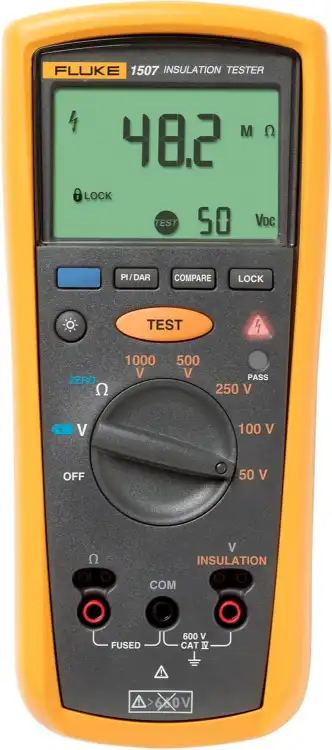
Hell’s Forge MAX Propane Forge Double Burner Unit
Check on AmazonKey Specs:
- Remote test probe for easy access
- Live circuit detection for user protection
- Large, backlit display for easy reading
- Automatic calculation of polarization index and dielectric absorption ratio
- Compare (Pass/Fail) function for repetitive testing
The Fluke 1507 Digital Megohmmeter Insulation Resistance Tester is designed for easy, accurate testing of insulation resistance. It features a remote test probe for hard-to-reach tests and live circuit detection for added safety. With a large backlit display, measurements are easy to read, and the Compare (Pass/Fail) function streamlines repetitive testing. The tester automatically calculates polarization index and dielectric absorption ratio, saving you time and improving efficiency.
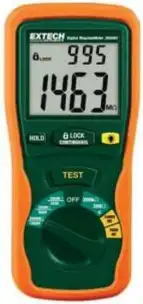
Extech 380260 Autoranging Digital Insulation Tester
Check on AmazonKey Specs:
- Battery-powered
- Large backlit LCD displaying 35 parameters
- Datalogging up to 30,000 measurement sets
- Measures current up to 1200A and voltage up to 600V
- Supports single-phase and 3-phase systems
The Extech 380260 Autoranging Digital Insulation Tester offers powerful datalogging capabilities with the ability to store up to 30,000 sets of measurements. It supports single-phase, 3-phase/3-wire, and 3-phase/4-wire systems, displaying 35 parameters simultaneously on a large backlit LCD. This tester measures active, apparent, and reactive power, as well as power factor, voltage (up to 600V), and current (up to 1200A), providing accurate results for electrical testing and analysis.
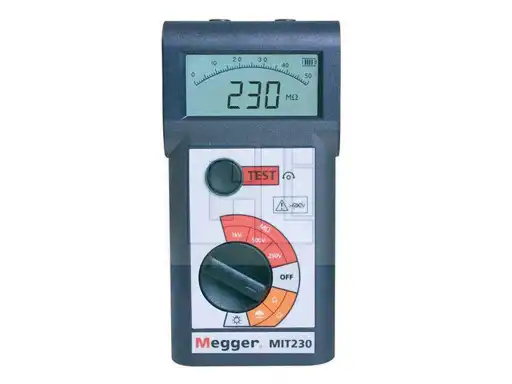
Megger MIT230-EN Insulation Tester
Check on AmazonKey Specs:
- Battery-powered
- Measures insulation resistance from 0 to 1,000 megaohms
- Voltage range from 25 to 600V and continuity from 0.01 to 100 ohms
- Dual digital display with analog arc function
- Safety rated to EN61010-1 Category III, 600V, and IP40 protection
The Megger MIT230-EN Insulation Tester is a reliable tool for testing insulation resistance, voltage, and continuity in electrical installations. It features an average-sensing meter for accurate readings in linear loads and a dual digital display with an analog arc function for easy interpretation. The tester measures insulation resistance up to 1,000 megaohms, voltage from 25 to 600V, and continuity from 0.01 to 100 ohms, all while adhering to European safety standards.
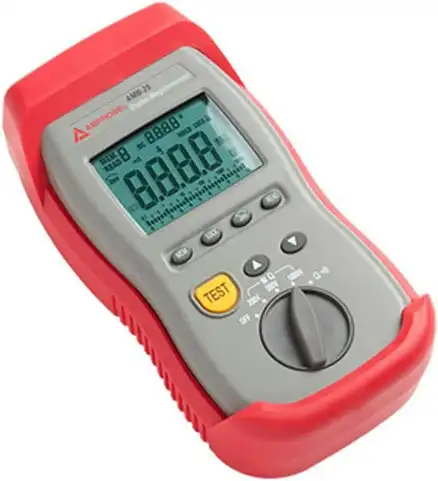
Amprobe AMB-25 Digital Insulation Resistance Tester
Check on AmazonKey Specs:
- Battery-powered
- Measures insulation resistance from 0 to 1,000 megaohms
- Selectable test voltages: 250V, 500V, and 1,000V DC
- Internal memory stores up to 9 test results
- Safety rated to EN 61010-1 Category III, 1,000V
The Amprobe AMB-25 Digital Insulation Resistance Tester is a versatile tool for testing the insulation of wires, cables, transformers, and electrical motors. With automatic range selection and internal memory that stores up to 9 test results, this digital meter is designed for efficient testing. It measures insulation resistance from 0 to 1,000 megaohms at selectable test voltages of 250V, 500V, and 1,000V DC. Additionally, it features a programmable timer for dielectric absorption ratio tests.
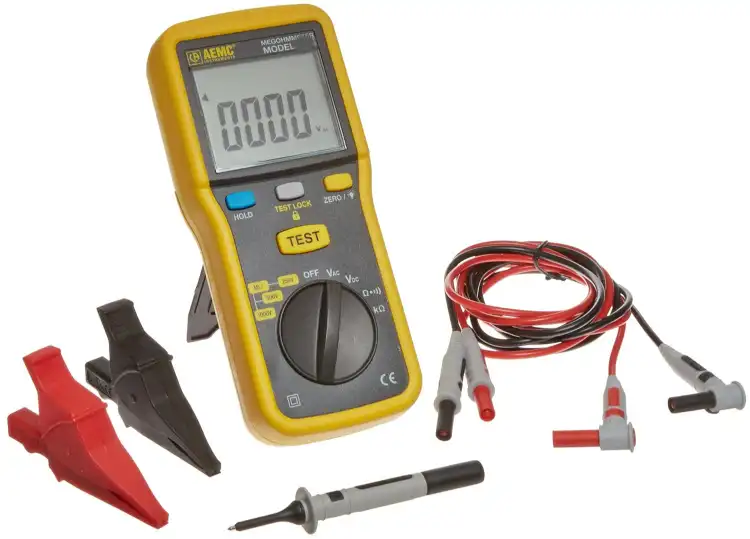
AEMC 2126.53 Digital Megohmmeter
Check on AmazonKey Specs:
- Battery-powered
- Insulation test voltage selections: 250V, 500V, 1,000V
- EST LOCK feature for timed measurements up to 15 minutes
- Auto discharge after insulation test
- AC/DC voltmeter up to 600VAC/1,000VDC
The AEMC 2126.53 Digital Megohmmeter is a true megohmmeter designed for precise insulation resistance testing. It offers selectable insulation test voltages of 250V, 500V, and 1,000V. The EST LOCK feature allows for timed measurements up to 15 minutes, while the auto-discharge function ensures safety after insulation tests. This versatile device also functions as an AC/DC voltmeter, measuring up to 600VAC and 1,000VDC, providing comprehensive electrical testing capabilities.
Understanding Insulation Resistance Testers
Insulation resistance testers, also known as megohmmeters, are devices used to measure the resistance of electrical insulation. They apply a high voltage, typically between 500 and 15,000 volts, across the insulation and measure the current that flows through it. The resistance is then calculated using Ohm’s law.
The importance of insulation resistance in electrical systems cannot be overstated. Insulation resistance is what prevents current from leaking out of wires and causing electrical shocks or fires. It also ensures that the electrical system can operate efficiently and safely.
Therefore, regular testing of insulation resistance is necessary to detect any potential issues early. It allows for timely maintenance or replacement of the insulation, preventing costly damages and dangerous situations.
Key Features of Insulation Resistance Testers
Insulation resistance testers come with a variety of features. One of the key features is the voltage range. Different types of insulation require different testing voltages. Therefore, a good insulation resistance tester should have a wide voltage range to accommodate various types of insulation.
The resistance measurement range is another important feature. It determines the range of resistance values that the tester can measure. A wider range allows for more accurate and versatile testing.
Accuracy and precision are crucial in insulation resistance testing. The tester should provide accurate and consistent readings to ensure reliable results. Safety features, such as protection against overvoltage and automatic discharge of capacitive and inductive loads, are also important to protect the user and the equipment being tested.
Factors to Consider When Buying Insulation Resistance Testers
When buying an insulation resistance tester, several factors should be considered. The purpose and application of the tester is the first consideration. Different testers are designed for different applications, such as industrial, commercial, or residential use. Therefore, it’s important to choose a tester that fits your specific needs.
Budget considerations are also important. While higher-priced testers often come with more features and better accuracy, they may not be necessary for all applications. Therefore, it’s important to balance the cost with the features and accuracy you need.
Brand reputation and reliability should also be considered. Brands with a good reputation often provide high-quality products and good customer service. The ease of use and user interface of the tester is another important factor. A tester with a user-friendly interface can make the testing process easier and more efficient.
Understanding the Importance of Accurate Measurements
Accurate measurements play a crucial role in ensuring the safety of electrical systems. They allow for the detection of potential issues early, preventing electrical shocks, fires, and equipment damage. Accurate measurements also ensure that the electrical system is operating efficiently, reducing energy waste and saving costs.
Accurate measurements also impact the longevity of electrical systems. By detecting issues early, timely maintenance or replacement can be performed, extending the lifespan of the system. This not only saves costs but also reduces the environmental impact by reducing waste.
Inaccurate measurements, on the other hand, can lead to system failures. They can cause undetected issues to worsen over time, leading to costly damages and dangerous situations. Therefore, it’s crucial to ensure accurate measurements in insulation resistance testing.
Top Brands of Insulation Resistance Testers
There are several leading brands in the insulation resistance tester market. These include Fluke, Megger, and Hioki. These brands are known for their high-quality products, accuracy, and reliability.
When comparing these brands, it’s important to consider their features, accuracy, and price. While all these brands provide high-quality testers, they may differ in terms of features and price. Therefore, it’s important to choose a brand that fits your specific needs and budget.
It’s also important to consider the after-sales service provided by the brand. Good after-sales service can provide you with peace of mind and ensure that you can get the most out of your tester.
How to Use an Insulation Resistance Tester
Using an insulation resistance tester involves several steps. First, the tester is connected to the insulation to be tested. Then, the tester applies a high voltage across the insulation and measures the current that flows through it. The resistance is then calculated using Ohm’s law.
It’s important to follow the manufacturer’s instructions when using the tester. This ensures accurate measurements and prevents damage to the tester or the insulation. It’s also important to take safety precautions, such as wearing protective equipment and ensuring that the insulation is not live during testing.
After testing, the results should be recorded and analyzed. Any abnormal readings should be investigated further, as they may indicate potential issues with the insulation.
Maintenance and Care for Insulation Resistance Testers
Regular calibration is necessary to ensure the accuracy of insulation resistance testers. Calibration should be performed according to the manufacturer’s recommendations, or whenever the tester is dropped or exposed to extreme temperatures.
Proper storage and handling are also important to maintain the performance and lifespan of the tester. The tester should be stored in a clean, dry place and protected from extreme temperatures and humidity. It should also be handled with care to prevent damage.
Regular cleaning is also necessary to keep the tester in good condition. The tester should be cleaned with a soft, dry cloth. Any dirt or debris on the tester can affect its accuracy and performance.
The Future of Insulation Resistance Testing
Technological advancements are continuously improving the capabilities of insulation resistance testers. These advancements include higher accuracy, wider measurement ranges, and more user-friendly interfaces. They also include new features, such as data logging and wireless connectivity, which can make the testing process more efficient and convenient.
These advancements can greatly improve the accuracy and safety of insulation resistance testing. They can allow for more accurate detection of potential issues, preventing costly damages and dangerous situations. They can also make the testing process easier and more efficient, saving time and resources.
As technology continues to advance, we can expect to see even more improvements in insulation resistance testers. These improvements will continue to enhance the safety and efficiency of electrical systems, benefiting both the industry and the consumers.
Conclusion
Accurate measurements in insulation resistance testing are crucial for the safety and efficiency of electrical systems. They allow for early detection of potential issues, preventing costly damages and dangerous situations. Therefore, it’s important to choose an insulation resistance tester that provides accurate and reliable measurements.
When choosing an insulation resistance tester, several factors should be considered. These include the purpose and application of the tester, budget considerations, brand reputation and reliability, and ease of use and user interface. By considering these factors, you can choose a tester that fits your specific needs and ensures the safety and efficiency of your electrical systems.
In conclusion, insulation resistance testers are essential tools in the electrical industry. They ensure the safety and efficiency of electrical systems, protecting equipment and individuals from electrical shocks and fires. By understanding these testers and the importance of accurate measurements, you can ensure the safety and longevity of your electrical systems.
FAQs
What is an insulation resistance tester used for?
It measures the resistance of electrical insulation to ensure safety and prevent hazards.
How do you use an insulation resistance tester?
Connect the leads to the equipment, set the voltage, and run the test to measure insulation resistance.
Why is insulation resistance important?
It prevents electrical leakage, shocks, and fires by ensuring the insulation is intact.
What is considered a good insulation resistance reading?
A good reading is typically several megaohms or higher, indicating healthy insulation.
Can insulation resistance testers be used on live circuits?
It’s unsafe to use them on live circuits unless the tester supports live testing. Always power off equipment before testing.
